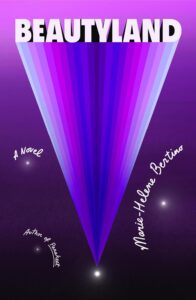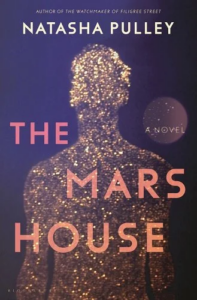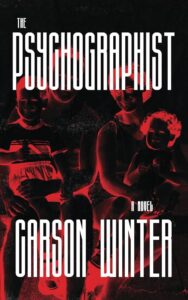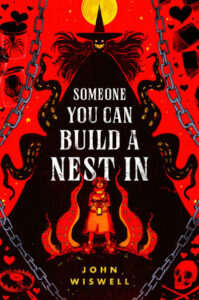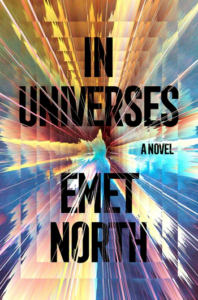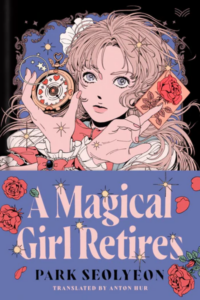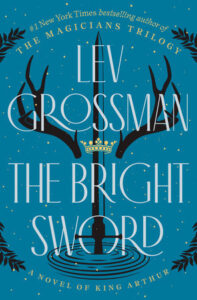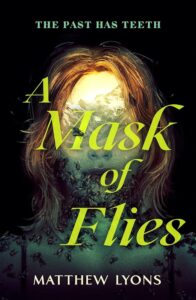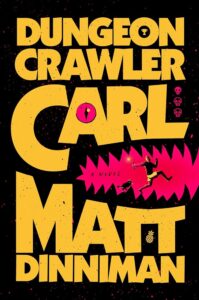
17 of the Best Science Fiction, Fantasy, and Horror Books of 2024
Aliens, Magic, Scares, and More
You’ve probably figured out by now that the Lit Hub staff reads a lot of literary fiction—but we also read a lot of weird shit. I’m talking odd novellas full of magical realism, I’m talking chunky sci-fi epics, I’m talking swords and sorcery and bloody monsters in the woods. So in addition to our big list of our favorite books of the year, we thought we’d also bring you a list of some of the great 2024 SFFH titles that we loved. It’s not even all of the SFFH that we loved, because some of us read a lot of it—but it’s a good cross-section of what the year had to offer.
(You might notice some overlap between this and the aforementioned larger best-of list—hooray for genre infiltrating the mainstream! Like a spooky fungal network of weirdness! Also, our definition of these genres is purposefully expansive—one man’s literary fiction might be another’s horror, because genre definitions are all made up. Anyway, Cthulhu Fhtagn etc!)
*
Marie-Helene Bertino, Beautyland
FSG, January 16
As previously recommended: It is a funny side-effect of working in books that I often end up reading new fiction months before the rest of the world. As such, I read Beautyland for the first time nearly eighteen months ago—I begged for an early galley and dove right in when it arrived, because Marie-Helene Bertino is one of my favorite writers. I have not stopped thinking about it since. Every single thing Bertino writes contains a glimmering magic and a spritely playfulness, but Beautyland is something special even by her own high bar. The story is simple enough: a young girl growing up in Philadelphia with her single mother believes that she is an alien, here to report back on what it means to be human.
But what could’ve been mawkish or silly in other hands is instead the single most heartwarming thing you’ll read this (or maybe any) year. It is a big hug of a book, a warm blanket, a friend’s laughter across a bar, the way the moon makes icy branches bend in circles, the feeling of sitting down after a long day… I could go on. It is a book that will make you have hope, not just for humanity but for the very personal act of being a human being. If you are struggling right now to see the beauty of this life, Beautyland holds the key. –Drew Broussard, Podcasts Editor
Tobias Carroll, In the Sight
Whisk(e)y Tit, February 6
I love a strange novella, particularly one that comes upon me unawares. Tobias Carroll’s latest is so deeply my shit in that respect and really in every other. It’s about a guy who drives around the country peddling experimental DIY brain modification drugs who ends up kind of on the run—sounds like a thriller and it is, in the same way that Lost Highway is a thriller. that Universal Harvester is a thriller. It’s a quick read, brilliant for a cold day or a dark night, with the right level of strangeness to send your own mind a-wandering. And if that isn’t it’s own form of DIY brain modification… –DB
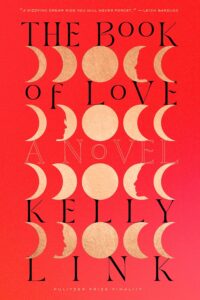
Kelly Link, The Book of Love
Random House, February 13
As previously recommended: Kelly Link speaks to my inner child. This is not to say that her books are childish, only that they are full of open doors. Many of the doors in this novel lead to places I recognize, as someone who grew up with Princess Cimorene (IYKYK): the generic touchstones, the tone of her humor—half eye-roll, half wink—the abundance, the play. The joy! Of course, some of the doors lead to new places, and this is the magic of Kelly Link. There’s no point in explaining the plot, which doesn’t have anything to do with why it’s so good (this is something I could write about every book I love). Suffice it to say that The Book of Love is bursting with doors, with ideas, with relationships, with myth, it’s big and satisfying and escapist (in places) and difficult (in places) and wonderful. –Emily Temple, Managing Editor
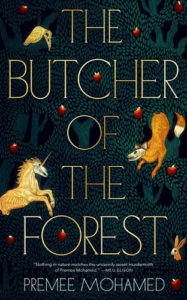
Premee Mohamed, The Butcher of the Forest
Tordotcom, February 27
Mohamed’s terrific novella hits the ground sprinting and never slows up. A woman named Veris is pulled from her home to come before the Tyrant who has conquered her people (and so many others): the Tyrant’s two young children have gone into the forbidden woods at the edge of the kingdom. Only one person has ever come back from those woods—and so Veris is sent in to recover them. She has one day to do it, or her family and town will be put to the sword. She might have something like a magical ability, but in a dangerous magical wood, that might not be enough. This is what Tordotcom does best and Mohamed’s horror-fantasy is the best of the best. I could’ve stayed in this world for five times as long—but it’s even stronger in my imagination because of its brevity. (Her other release this year, The Siege of Burning Grass, has been burning a hole in my TBR; hard to get to all the books in the year, but in 2025, I expect great things.) –DB
Natasha Pulley, The Mars House
Bloomsbury, March 19
I loved this book when I read it in 2023 (see my note earlier about Beautyland) and it feels all the most potent in the wake of the election. It begins when the principal ballerina of the London Ballet must flee a flooded London to become a climate-refugee on Mars. There, he (along with all other Earthstrongers) must wear a cage that weighs down his body in Mars’s lighter gravity—and when he finds himself at the center of a political firestorm, he ends up in an arranged marriage with a xenophobic nativist Martian politician. Big enemies-to-lovers energy ensues, and very little is what it initially seems in Pulley’s twisty, soapy, sci-fi romp. The book considers, in ways I thought compelling, the ethics of power and the way that being persecuted can turn a people into persecutors. Also, they talk to mammoths!! –DB
Carson Winter, The Psychographist
Apocalypse Party, April 2
In the last couple years, Carson Winter has developed a lane in what I’d loosely call “anti-capitalist horror” and The Psychographist is the most overt condemnation of marketing and modern mass-consumption that I’ve seen from him so far. It’s about a classically conceived middle-American family of four, struggling with jobs and marriage and a mortgage and high school and friendship, when they’re offered an opportunity to make a bunch of money by letting a strange product sit in their house. They’ll be a focus group, although they don’t know or understand what it is that’s being studied. When the Hoyers embrace Mr. Cormorant’s offer, they begin a Bret Easton Ellis-ish descent into depravity. Things end up like they do towards the end of Stephen King’s Needful Things except somehow much worse. A sharp evisceration of the ‘American Dream’ of more, more, more. –DB
John Wiswell, Someone You Can Build a Nest In
DAW, April 2
I don’t know that I could have rightly conceived of ‘cozy horror’ before reading Wiswell’s charming debut—The Addams Family, maybe?–but there’s no better way to describe this book’s genre. Shesheshen, Wiswell’s brilliantly original monster, is a delightful narrator and the world-building is gently expansive, with room for the imagination to play in the margins. Also, it’s a joy to see ace/aro main characters getting solid rep in a romance novel—and make no mistake, this definitely features the S and the H from SFFH but it also tags on an R. Cross-genre exuberance is the future!! –DB
Emet North, In Universes
Harper, April 30
The multiverse is so hip right now, but Emet North’s astonishing debut reminds readers that the very idea of alternate universes should be almost impossible to truly comprehend. The novel-in-stories (or is it??) follows four characters across lives that look very different, sometimes so different that they might be completely unrelated… except that the characters (Raffi, Britt, Kay, and Graham) continue to evolve, to show new facets of themselves even in nearly-unrecognizable circumstances. It’s a stunning trick, to knit these stories into a cohesive whole while also letting each of them be their own kind of strange. It’s a kind of literary derring-do that I wish we saw more of, and it’s one of the best novels about queering our conception of the world in order to better embrace its many, multi-faceted wonders. –DB
Park Seolyeon, tr. Anton Hur, A Magical Girl Retires
HarperVia, April 30
As previously recommended: If novellas have zero fans, I’m dead. I loved this fun, campy book about a depressed millennial woman who finds out she might be The Chosen One. It’s sweet and smart and funny and knows exactly what it’s doing. Usually high concept books like this get a little lost in their own sauce, but Seolyeon keeps her focus tight and gets in and out quickly. It’s also a very grounded book in a lot of ways. Even though the world of the book bears more resemblance to Sailor Moon than the real world, the protagonist is mostly struggling with issues that any former-gifted-kid-turned-gay-adult can relate to: what’s her place in the world? Has she let her past self down? Does she have a crush on her high femme best friend? A Magical Girl Retires is as much fun as you’d expect it to be (read: extremely). –McKayla Coyle, Publishing Coordinator
Lev Grossman, The Bright Sword
Viking, July 16
As previously recommended: The thing about stories is that they don’t end, not really. Arthur falls to Mordred and his body is taken to Avalon—but that is not the end. What happened to the Round Table, the knights who survived that final campaign? And what does it say about English (or, even more broadly, Western) culture that there still lingers some sense that perhaps Arthur waits yet on the fair isle, to someday return when he is needed most? What does that tell us about ourselves, that we hang onto these stories and still manage to see ourselves inside of them?
Lev Grossman’s ambitious novel does not provide a definitive answer to any of these questions, but neither do other modern interrogations of what was lost when Arthur died like Kazuo Ishiguro’s The Buried Giant or Jez Butterworth’s Jerusalem—and yet, perhaps by virtue of his being an American, Grossman dispenses with fidelity to the Englishness of it all and instead sets out to tell a cracking good story. It is, at its most simple, the story of a young knight who arrives at Camelot to prove himself and join the Round Table, only to find that he’s missed the good stuff. Arthur is dead, and the few knights who remain are washed up, strange, and rudderless.
But the story isn’t over and Grossman’s doorstopper absolutely zips by with magic, monsters, swordplay, and a stirringly inclusive reimagining of the Round Table. All the names you’re hoping make an appearance do—but it isn’t fan service. Rather, Grossman is using the joys of these elements to interrogate (as one character ponders) “why, when we are made for a bright world, we must live in a dark one.” At the time of this writing, I confess that this question is more pressing than I would’ve imagined when I read Grossman’s book this spring. If you are pondering it too, perhaps venturing into this epic of knights, monsters, legends, and self-discovery will help keep your candle burning against the dark times to come. –DB
Matthew Lyons, A Mask of Flies
Tor Nightfire, August 6
In Matthew Lyons’ propulsive new horror thriller, a bank robbery gone sideways forces one of the robbers to take the remnants of her gang, plus a hostage or two, to her old family cabin to recoup and recover. Upon arrival, they discover a VHS with terrifying metaphysical implications as Lyons takes a sharp left turn towards Lovecraftian cosmic horror. –Molly Odintz, CrimeReads Managing Editor
Matt Dinniman, Dungeon Crawler Carl
Ace, August 27
If a self-published book makes the move to a traditional publisher, does that make it a new book for that year? Does it matter? A friend suggested I take a look at Matt Dinniman’s Dungeon Crawler Carl series when it started a couple years ago, but LitRPG is a tricky field to get right—I’d mostly rather listen to my beloved actual-play podcasts (shout-outs particularly to The Glass Cannon Network and The Adventure Zone) to get all the dice-rolling I need. What a lovely surprise, then, that Dinniman’s Douglas-Adams-but-playing-D&D romp was so much fun that I immediately went out and got the next two books (in their PRH hardcovers, because I also love a full matching set). It isn’t perfect but it’s better: it feels genuinely joyful, written for the sheer pleasure of it and that pleasure is infectious. These books got me through the week after the election with less psychic damage than I might’ve otherwise incurred. This one’s for anybody who knows what I mean when I say “roll-ricka-roll for initiative.” –DB
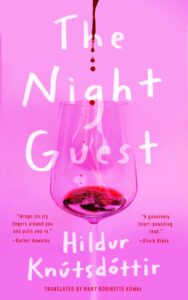
Hildur Knútsdóttir, tr. Mary Robinette Kowal, The Night Guest
Tor Nightfire, September 3
Knútsdóttir’s English-language debut is short, sharp, and stunning. It’s a simple premise, as with all the best psychological horror: a woman is suffering from constant fatigue and no doctor can figure out the problem. But when she falls asleep with her smartwatch on, she wakes to discover that she’s walked incredible distances in the night. What was she doing? Does anyone else have slightly mysterious bruises? Is she in control of herself, or is someone (or something) else driving? A perfect chiller, for fans of Sara Gran’s Come Closer. I can’t wait to see what we get from Knútsdóttir next. –DB
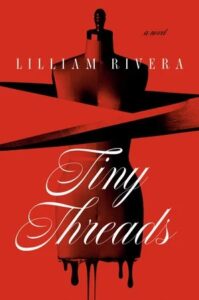
Lilliam Rivera, Tiny Threads
Del Rey, September 24
Lilliam Rivera cuts the fashion industry to shreds in this horror-filled take on late stage capitalism. At the novel’s start, Samara has just begun a new job for a legendary fashion house; she arrives optimistic but quickly becomes aware of the classism and racism underlying the business of couture. Tiny Threads takes us into the back rooms of fashion giants, showing us the stark differences between the haves and have-nots, but there’s more to unravel in this terrifying yarn. Okay, enough with the needlecraft puns. –MO
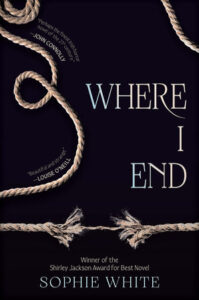
Sophie White, Where I End
Erewhon Books, September 24
I have recommended some truly twisted novels on this site (thank you, Lit Hub, for allowing me to live up to my creepiest potential!) but I think this may be the most disturbing one yet. White’s novel was first published two years ago, to much acclaim and little readership, and given that I was one of the many who remained ignorant when it first graced the earth, I’m so happy this sneaky little masterpiece got another shot at messing up readers. But what is it about? Well, quite a lot, actually, but the bare bones description goes thusly: a young woman lives on a remote Irish island, where she and her grandmother reluctantly care for her comatose mother, known as the “bed-thing”. The island’s small population is convinced the family is cursed, but it isn’t until White’s Shirley-Jackson-esque narrator meets a visiting artist that she begins to understand the full wrong-ness of her short life. –MO
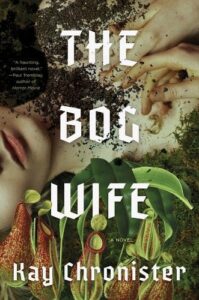
Kay Chronister, The Bog Wife
Catapult, October 1
Shirley Jackson is one of the patron saints of weird families for good reason: We Have Always Lived in the Castle is a masterpiece of family dynamics and creeping dread. So I don’t say lightly that Kay Chronister’s The Bog Wife is a perfect read for all of the Merricat lovers out there: it’s about an odd family with complicated dynamics and the dread, it does creep. The family in question, the Haddesleys, have lived by a cranberry bog in the West Virginian wilderness for generations—tending the bog and the ‘bog wives’ who come from it in the wake of the death of the previous patriarch, in order to carry on the line. But the line has withered in various ways by the time the novel begins and Chronister juggles multiple points of view, all of them contributing to the reader’s unease and uncertainty about the possible supernatural qualities of the family’s story, without ever sacrificing on emotional intensity. Before you go home for the holidays and grump about your family’s oddities, be thankful you’re not a Haddesley. –DB
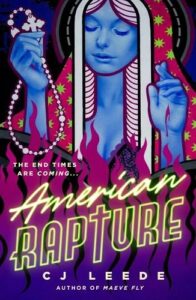
CJ Leede, American Rapture
Tor Nightfire, October 15
As previously recommended: Maeve Fly, CJ Leede’s Splatterpunk-winning debut, was a real bolt from the blue: nasty, funny, thrilling, and a read that took me by complete surprise. But if that book set Leede’s marker as a writer to watch, American Rapture establishes that she, as the saying goes, definitely has the range—and the rage. American Rapture is at once a furious howl at American puritanism and religious oppression, a joyful cry of the power of found family and self-honesty, and a thrill-ride through maybe the best American outbreak-story since The Stand.
It follows Sophie, a good Catholic teen, as she undergoes a confusing sexual awakening at the same moment as a virus turns most of the American population into slavering lust-zombies. The book is unflinching in its depictions of violence both spiritual and physical (animal lovers should be aware/forewarned: there is one of the best dogs in all of modern fiction in this book, a good and ultimately very brave boy) and I was a sobbing mess for the last fifty pages, which is all to Leede’s credit: the experience of reading this book is that of catharsis by cleansing fire. It is an incredible example of what not just good horror novels but good novels period can do. –DB
Drew Broussard
Drew Broussard is a writer, podcaster, bookseller, and producer of creative events. He spent nearly a decade at The Public Theater before decamping to the woods of upstate New York, where he lives with his wife and dog.









